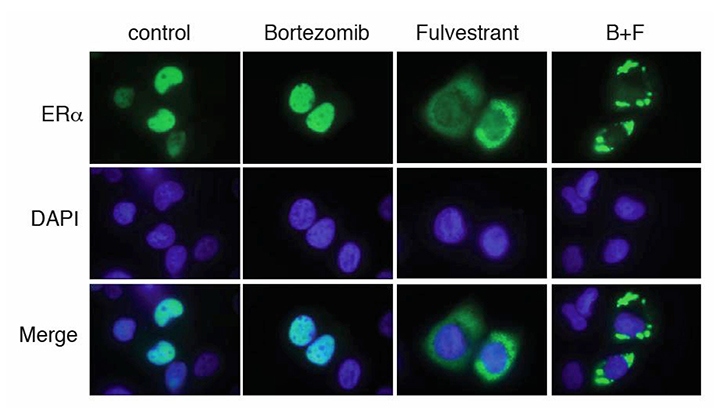New drug combination for advanced breast cancer delays disease progression

The trial enrolled 118 post-menopausal women with metastatic hormone-receptor-positive breast cancer whose cancer continued to progress after being treated with an aromatase inhibitor.
The study, based on work done by Doris Germain of Mt. Sinai Hospital, found that the combination of the drugs bortezomib and fulvestrant — versus fulvestrant alone — doubled the rate of survival at 12 months and reduced the chance of cancer progression overall.
Bortezomib, used most commonly in treating multiple myeloma, is a proteasome inhibitor that prevents cancer cells from clearing toxic material.
Fulvestrant causes clumping of the estrogen-receptor protein. When bortezomib blocks the ability of the cell to clear these protein clumps, they grow larger and become toxic to the cancer cells. This, in turn, amplifies the effectiveness of fulvestrant, a drug commonly used in this subset of patients.
The drug combination doubled the number of patients whose cancer had not progressed after one year from 14% to 28%, according to Adelson.
“This provides the foundation for future studies combining selective estrogen-receptor destroyers with proteasome inhibitors,” Adelson said. “Because the study showed a statistically significant benefit among patients whose disease progressed on an aromatase inhibitor, a larger phase III study comparing this combination to other approved therapies used after initial therapies fail, like exemestane and everolimus, should be done.”
The study results also suggest that the drug combination can delay or overcome resistance to fulvestrant. The combination should be studied in other populations of patients, Adelson added, including those who are newly diagnosed with metastatic breast cancer and those who have already progressed on fulvestrant.
Adelson was the study’s principal investigator for the New York Cancer Consortium. Study support included funding from National Cancer Institute/CTEP; and Millenium, the Takeda Oncology Company.
Yale Cancer Center (YCC) is one of only 41 National Cancer Institute (NCI)-designated comprehensive cancer centers in the nation and the only such center in Connecticut. Comprehensive cancer centers play a vital role in the advancement of the NCI’s goal of reducing morbidity and mortality from cancer through scientific research, cancer prevention, and innovative cancer treatment.
Media Contact
All latest news from the category: Life Sciences and Chemistry
Articles and reports from the Life Sciences and chemistry area deal with applied and basic research into modern biology, chemistry and human medicine.
Valuable information can be found on a range of life sciences fields including bacteriology, biochemistry, bionics, bioinformatics, biophysics, biotechnology, genetics, geobotany, human biology, marine biology, microbiology, molecular biology, cellular biology, zoology, bioinorganic chemistry, microchemistry and environmental chemistry.
Newest articles

A universal framework for spatial biology
SpatialData is a freely accessible tool to unify and integrate data from different omics technologies accounting for spatial information, which can provide holistic insights into health and disease. Biological processes…

How complex biological processes arise
A $20 million grant from the U.S. National Science Foundation (NSF) will support the establishment and operation of the National Synthesis Center for Emergence in the Molecular and Cellular Sciences (NCEMS) at…

Airborne single-photon lidar system achieves high-resolution 3D imaging
Compact, low-power system opens doors for photon-efficient drone and satellite-based environmental monitoring and mapping. Researchers have developed a compact and lightweight single-photon airborne lidar system that can acquire high-resolution 3D…





















